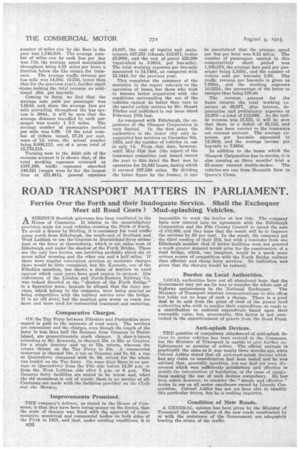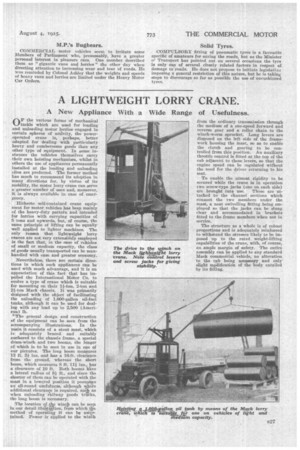ROAD TRANSPORT MATTERS IN PARLIAMENT.
Page 10

Page 11

If you've noticed an error in this article please click here to report it so we can fix it.
Ferries Over the Forth and their Inadequate Service. Shall the Exchequer Meet all Road Costs ? Mud-splashing Vehicles.
ASERIOUS Scottish grievance has been ventilated in the House of Commons. It relates to the unsatisfactory provision made for road vehicles crossing the Firth of Forth. To avoid a detour by Stirling, it is necessary for road traffic going north from Edinburgh, the south-east of Scotland and West Lothian to use the Granton to Burntisland ferry steamboat or the ferry at Queensferry, which is ten miles west of Edinburgh and under the shadow of the Forth Bridge. These are the only two ferries, one involving probably about six or seven miles' crossing and the other one and a half miles. If there were regular convenient services at moderate charges there would be little complaint, but Mr. Kennedy, one of the Fifeshire members, has showo a state of matters to exist against which road users have good reason to protest. His indictment of the London and North-Eastern Railway Co. was indeed directed at the "shadow of the Forth Bridge" in a figurative sense, because he alleged that the ferry services, which belong to the company, were being starved as being competitive with the railway service over the bridge. It is an old story, but the position gets worse as roads are more and more used for commercial transport and motoring.
Comparative Charges.
ON the Tay Ferry between Fifeshire and Forfarshire more regard is ;mid to the interests of road users. The services are convenient and the charges, even though the length of the ferry is less than half the distance from Granton to Burntisland, are proportionately much cheaper. A char-à-banes, according to Mr. Kennedy, is charged 30s. to 35s. at Granton for a single journey and up to 75s. return, whereas the return charge on the Tay Ferry is 10s. A commercial motorran is charged 10s. a ton at Granton and 7s. 6d. a ton at Queensferry compared with 8s. 6d. return for the whole van loaded on the Tay ferry. On some days there is no passage at Queensferry from the Fife side before 12.30 p.m, or from the West Lothian side after 5 p.m. or 6 p.m. • The Granton ferry facilities are stated to be worse and, when the old steamboat is out of repair, there is no service stall. Contrasts are made with the facilities provided on the Clyde and the Mersey.
Improvements Promised.
THE company's defence, as stated in the House of Commons, is that they have been losing money on the ferries, that the scale of charges was fixed with the approval of representative municipal and commercial bodies on both sides of the Firth in 1921, and that, under existing conditions, it is 1126
impossible to work the ferries at low tide. The company have now entered into an agreement with the Edinburgh Corporation and the Fife County Council to spend the sum of £12,000, and they hope that the result will be to improve the services by 50 per coat In the result, the company got the third reading of their Bill, but with a reminder from one Edinburgh member that if better facilities were not granted a much greater demand would arise for the construction of a road bridge, which, one imagines, would be a much more serious source of competition with the Forth Bridge railway than efficient and cheap ferry services. No indication was given that the charges would be reduced.
Burden on Local Authorities.
LOCAL authorities have not all abandoned hope that the Government may yet see its way to transfer the whole cost of highway maintenance to the National Exchequer. The Minister of Transport receives communications to this effeet hut holds out no hope of such a change. There is a good deal to be said from the point of view of the poorer local authorities who wish to confine their expenditure on roads to a contribution to national expenditure based upon their assessable value, but, presumably, this factor is not overlooked in the apportionment of grants from the Road Fund.
Anti-splash Devices.
THE question of compulsory attachment of anti-splash devices to motor vehicles has been revived in the Commons, hut the Minister of Transport is unable to give further enlightenment or promise of action. The official attitude is practically the same as it was nearly three months ago, when Colonel Ashley stated that all anti-mud-splash devices which had any claim to consideration had been tested and he was advised that, -generally speaking, not one had yet been discovered which was sufficiently satisfactory and effective to jestify the introduction of legislation, or the issue of regulations making the use of such devices compulsory. He has been asked, however, to consider the " simple and effective " device in use on all motor omnibuses owned by Lincoln Corporation. Colonel Ashley has not yet been able to identify this particular device, but he is making inquiries.
Condition of New Roads.
A. GENERAL opinion has been given by the Minister of Transport that the surfaces of the new roads constructed by or with the assistance of the Government are adequately bearing the strain of the traffic.
• M.P.'s Bugbears.
COMMERCIAL motor vehicles seem to irritate some Members of Parliament who, presumably, have a greater personal interest in pleasure cars. One member described them as "gigantic vans and lorries" the other day when directing attention to increasing wear and tear of roads. He was reminded by Colonel Ashley that the weights and speeds of heavy vans and lorries are limited under the Heavy Motor Car Orders.
Solid Tyres.
COMPULSORY fitting of pneumatic tyres is a favourite specific of amateurs for saving the roads, but as the Minister o-F Transport has pointed out on several occasions the tyre is only one of several closely related factors in respect of damage to roads. lie does not propose to initiate legislatiaa imposing a general restriction of this nature, but he is taking steps to discourage so far as possible the use of uncushioned tyres.




























